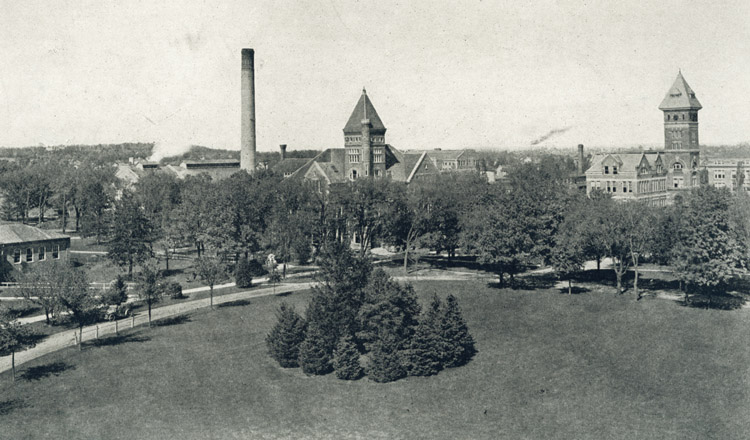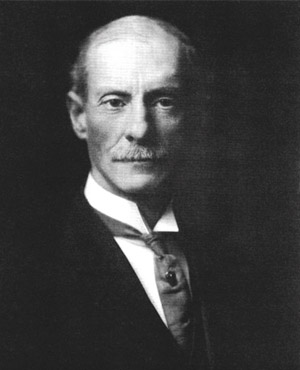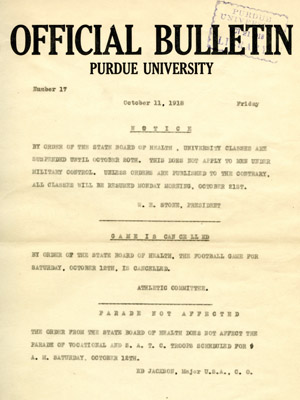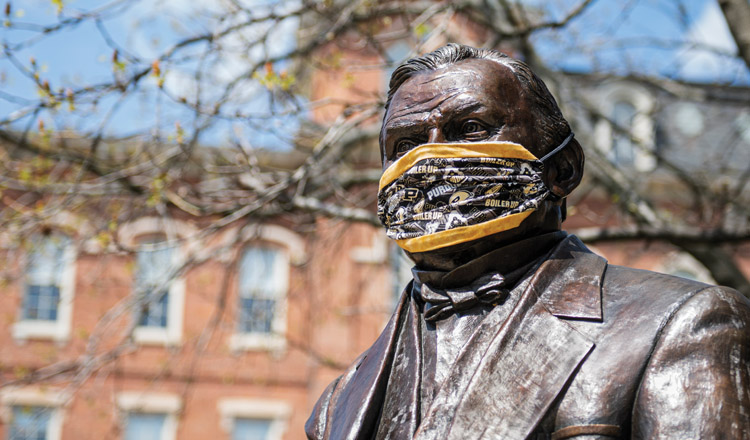
1918 Influenza Pandemic
The COVID-19 virus upended campus life, resulting in stay-home orders, early move out, online courses, and shuttered academic buildings. But it’s not the first time a pandemic interrupted university operations. In 1918, amid World War I, a flu pandemic forced similar closures and a suspension of classes. It also delayed the fall football season. Purdue played its first game on October 26 and finished the season November 30 with a 3–3 record.

Indiana State Board of Health from 1896 to 1921.
He is regarded as the state’s father of public health.
John Hurty (HDR P’1888), founding head of Purdue’s College of Pharmacy, was secretary of the Indiana State Board of Health in 1918. According to the Indianapolis News, on September 19, 1918, Hurty warned that the flu was “highly contagious” but stated that “quarantine is impractical.” One week later, he offered this advice:
If all spitting would immediately cease, and if all coughers and sneezers would hold a cloth or paper handkerchief over their noses and mouths when coughing or sneezing, then influenza and coughs and colds would almost disappear. We also must not forget to tone up our physical health, for even a few and weak microbes may find lodgment in low toned bodies. To gain high physical tone, get plenty of sleep in a well ventilated bedroom. Don’t worry, don’t feast, don’t hurry, don’t fret. Look carefully after elimination. Eat only plain foods. Avoid riotous eating of flesh. Go slow on coffee and tea. Avoid alcohol in every form. Cut out all drugs and dopes … Frown on public spitters and those who cough and sneeze in public without taking all precautions.

On October 11, when the epidemic was peaking in Indiana, the State Board of Health issued an order prohibiting large gatherings. At Purdue, classes were canceled from October 11 to October 30. All athletic events and club activities were also canceled, though military training exercises were required to carry on. Only a few weeks earlier, on October 1, Purdue released an official bulletin requiring “all men students to assemble on Stuart Field promptly at 11:00 a.m. today to take part in the nation wide ceremony of inaugurating the Students’ Army Training Corps.” The Purdue Exponent suspended publication for the fall semester as “all the members of the staff have been either in the SATC here or in training campus elsewhere.” In Ever True: 150 Years of Giant Leaps at Purdue University, author John Norberg writes:
The global influenza pandemic of 1918–1919, which infected about 500 million people worldwide and killed at least 50 million, also impacted Purdue, where 11 people died. In a 1918 Alumnus, editor George Ade reported: “Oct. 17 — the whole state is still under lock and key on account of the flu and Purdue is running on one cylinder. Oct. 18 — Further suspension of University classes announced by Dr. Stone (because of flu). Sad news received — Glossop, football captain in 1913, a fine athlete and popular fellow, dies at Camp Taylor of influenza.”
George Everhard Glossop (ECE’1915) became athletic director at the University of Washington upon graduation. He entered the service May 15, 1918, and was sent to Camp Taylor, Kentucky, where he was an instructor in officers training school, field artillery. He died October 16, 1918.
The Exponent resumed publication January 6, 1919. In that issue, its student editors ran a column titled “Beginning Anew,” which includes this excerpt:
It will be a hard uphill struggle to restore Purdue to her former normal status. We must not consider our personal selfish interests to the exclusion of the welfare of the student body as a whole. … We have a great and worthy task before us. Let us all put our shoulders to the wheel and build a bigger and better Purdue.

